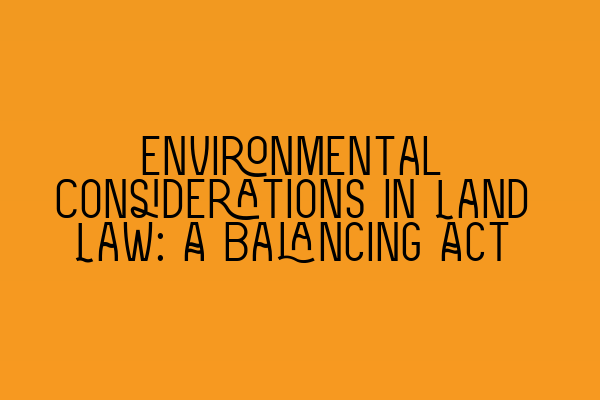Environmental Considerations in Land Law: A Balancing Act
In today’s world, where issues like climate change and environmental degradation have become paramount, it is crucial for land law to address and incorporate environmental considerations. The legal system plays a significant role in shaping and guiding our interactions with the environment and ensuring sustainable development. This blog post will explore the delicate balance between environmental considerations and land law, highlighting the importance of integrating environmental concerns into property transactions.
Environmental considerations in land law arise from the recognition that human activities can have profound impacts on the environment. Land use decisions have far-reaching consequences for ecosystems, natural resources, and the overall well-being of society. Therefore, it is essential to strike a balance between promoting economic development and safeguarding the environment.
One key aspect of environmental considerations in land law is the principle of sustainability. Sustainable land use seeks to meet the needs of the present generation without compromising the ability of future generations to meet their own needs. It involves managing land resources in a way that ensures their long-term viability and minimizes negative impacts on the environment.
Several legal mechanisms are in place to address environmental considerations in land law. One such mechanism is the requirement for environmental impact assessments (EIAs) in certain development projects. An EIA assesses the potential environmental effects of a proposed development, allowing decision-makers to make informed choices. It ensures that environmental considerations are taken into account from the outset, preventing irreversible damage to the environment.
Another important tool is the concept of environmental covenants, which are contractual agreements aimed at protecting the environment. These covenants can be included in land contracts and leases, stipulating certain environmental standards that must be adhered to by the parties involved. This approach ensures that environmental considerations are explicitly incorporated into property transactions and that all parties are held accountable for their environmental responsibilities.
Furthermore, statutory regulations and planning policies play a significant role in guiding land use decisions. These regulations often contain provisions that promote sustainable development and require developers to consider environmental impacts when designing projects. For example, planning permission may be conditional upon the installation of environmentally friendly infrastructure or the preservation of protected habitats.
The integration of environmental considerations into land law is a multidimensional task that requires collaboration between legal professionals, policymakers, and environmental experts. It also requires an understanding of the dynamic relationship between environmental sustainability and economic development. Striking a balance between these sometimes-conflicting goals is crucial to ensure a harmonious coexistence between human activities and the natural world.
For legal professionals specializing in land law, it is essential to have a thorough understanding of environmental considerations. This knowledge allows them to provide comprehensive advice to clients and ensure compliance with relevant environmental laws and regulations. Lawyers can guide clients through the complexities of environmental impact assessments, help negotiate environmental covenants, and ensure that land use decisions align with sustainability principles.
At SQE Property Law & Land Law, we recognize the significance of environmental considerations in land law. Our team of expert solicitors is well-versed in the intricacies of environmental law and can provide tailored advice to clients seeking to navigate the complex landscape of property transactions. Our holistic approach ensures that environmental considerations are integrated into every step of the legal process.
If you are interested in expanding your knowledge of legal concepts, we invite you to explore our related articles on Understanding Contractual Capacity: Rights and Limitations, Interactive SQE Mock Tests for Contract Law: Test Your Knowledge, Join Our SQE Contract Law Webinars: Expert Insights and Guidance, SQE Prep: Mastering the Essentials of Contract Law, and Contractual Capacity: Understanding Legal Competence in Contracting Parties. These resources will further enhance your understanding of legal principles and prepare you for success in your legal career.
In conclusion, environmental considerations in land law are crucial for promoting sustainable development and safeguarding the environment. Legal professionals must integrate these considerations into property transactions to ensure a responsible and ethical approach to land use. By striking a balance between economic development and environmental protection, we can create a future where both human society and the natural world thrive.
